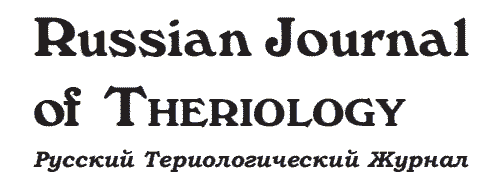Late Miocene Indarctos punjabiensis atticus (Carnivora, Ursidae) in Ukraine with survey of Indarctos records from the former USSR
Baryshnikov G.F.
P. 83-89
The detailed description of the latest Miocene (MN 13) maxillary fragment with P4-M2 of Indarctos bear from Ananiev in the southern Ukraine is given. The specimen is assigned to the subspecies I. punjabiensis atticus (Weithofer, 1888), comb. nov. A pronounced similarity revealed in tooth proportions and size between I. p. atticus and I. oregonensis from the North American late Miocene suggests I. oregonensis to be only a subspecies: I. punjabiensis oregonensis Merriam, Stock et Moody, 1916, comb. nov. The Indarctos records from the territory of the former USSR are reviewed.
DOI: 10.15298/rusjtheriol.1.2.02References- Beaumont G. de. 1988. Contributions à l'étude du gisement Miocène supérieur de Montredon (Herault). Les grands mammifères. 2 - Les Carnivores // Palaeovertebrata. Mémoire extraordinaire. P.15-42.
- Crusafont Pairó M. & Kurtén B. 1976. Bears and bears-dogs from the Vallesian of the Vallés-Penedés Basin, Spain // Acta Zoologica Fennica. No.144. P.1-29.
- Dames W. 1883. Über das Vorkommen von Hyaenarctos in den Pliocän-Ablagerungen von Pikermi bei Athen // Sitzungsberichte der Gesellschaft naturforschender Freunde zu Berlin. No.8. P.132-139.
- Dehm R. 1950. Die Raubtiere aus dem Mittel-Miocän (Burdigalium) von Wintershof-West bei Eichstätt in Bayern // Abhandlungen der Bayerischen Akademie der Wissenschaften, mathematisch-naturwissenschaftliche Klasse. Neue Folge. Hf.58. S.1-141.
- Dmitrieva E.L. & Nesmeyanov S.A. 1982. [Mammals and stratigraphy of continental Tertiary deposits of the South-West of Middle Asia] // Trudy Paleontologicheskogo Instituta AN SSSR. T.193. P.1-140 [in Russian].
- Dubrovo I.A. 1962. [Family Ursidae] // Gromova V.I. (ed.). [Fundamentals of Paleontology. Mammals]. Moskva: Gosudarstvennoe Nauchno-Tekhnicheskoe Izdatel'stvo Literatury po Geologii i Okhrane Nedr. P.214-218 [in Russian].
- Gabunia L.K. 1959. [To history of Hipparion]. Moskva: Izdatel'stvo Akademii Nauk SSSR. 571 p. [in Russian].
- Ginsburg L. 1999. Order Carnivora // Rössner G. & Heissig K. (eds.). Miocene Land Mammals of Europe. München: Verlag Dr. Friedrich Pfeil. P.109-148.
- Guérin C. 1980. Les rhinocéros (Mammalia, Perissodactyla) du Miocene terminal au Pleistocene superieur en Europe occidentale: Comparaison avec les espèces actuelles // Documents des Laboratoires de Géologie Lyon. No.79. Fasc.1. P.1-421.
- Helbing H. 1932. Über einen Indarctos-Schädel aus dem Pontien der Insel Samos. Nebst einem Anhang: Hyaenarctos spec. aus dem Pliocaen von Vialette (Haute-Loire) // Abhandlungen der schweizerischen palaeontologischen Gesellschaft. Bd.52. S.1-18.
- Hendey Q.B. 1980. Agriotherium (Mammalia, Ursidae) from Langebaanweg, South Africa, and relationships of the genus // Annals of the South African Museum. Vol.81. No.1. P.1-109.
- Hunt R.M., Jr. 1998. Ursidae // Janis C., Scott K. & Jacobs L. (eds.). Evolution of Tertiary Mammals of North America. Vol.1. Terrestrial Carnivores, Ungulates, and Ungulatelike Mammals. Cambridge University Press. P.174-194.
- Korotkevich E.L. 1988. [History of formation of Hipparion fauna in Eastern Europe]. Kiev: Naukova Dumka. 164 p. [in Russian].
- Lungu A.N. & Chemyrtan G.D. 1996. [New species of the genus Indarctos (Carnivora, Mammalia) from the Middle Sarmatian Hipparion fauna of Moldova] // Sokolov V.E. (ed.). [State of the Theriofauna in Russia and Adjacent Territories]. Moskva: Teriologicheskoe Obshchestvo. P.184-190 [in Russian, with English summary].
- Matthew W.D. 1929. Critical observations upon Siwalik mammals // Bulletin of the American Museum of Natural History. Vol.56. P.437-560.
- Merriam J.C., Stock Ch. & Moody C. 1916. An American Pliocene bear // University of California Publications. Bulletin of the Department of Geology. Vol.10. No.7. P.87-109.
- Petter G. & Thomas H. 1986. Les Agriotheriinae (Mammalia, Carnivora) néogènes de l'ancien monde presence du genre Indarctos dans la faune de Menacer (ex-Marceau), Algérie // Geobios. No.19. Fasc.5. P.573-586.
- Pevzner M.A., Lungu A.N., Vangengeim E.A. & Basilyan A.E. 1987. [Position of Vallesian localities of Hipparion fauna from Moldavia on magnetochronological scale] // Izvestiya AN SSSR. Seriya Geologicheskaya. No.4. P.50-59 [in Russian].
- Pevzner M.A., Vangengeim E.A., Zhegallo V.I., Zazhigin V.S. & Liskun I.G. 1982. [Correlation of late Neogene beds of Central Asia and Europe on the basis of paleomagnetic and biostratigraphical data] // Izvestiya AN SSSR. Seriya Geologicheskaya. No.6. P.5-16 [in Russian].
- Pilgrim G.E. 1914. Further description of Indarctos salmontanus Pilgrim, the new genus of bear from the Middle Siwaliks, with some remarks on the fossil Indian Ursidae // Records Geological Survey of India. Vol.44. Pt.3. P.225-233.
- Qiu Z. & Schmidt-Kittler N. 1983. Agriotherium intermedium (Stach, 1957) from a Pliocene fissure filling of Xiaoxian county (Anhuei province, China) and the phylogenetic position of the genus // Palaeovertebrata. T.13. No.3. P.65-81.
- Roth C.H. & Morlo M. 1997. Die Raubtiere (Mammalia, Carnivora) aus dem Turolium von Dorn-Dürkheim 1 (Rheinhessen). Teil 2: Ursidae // Courier Forschungs-Institut Senckenberg. Bd.197. S.49-71.
- Roussiakis S. 2001. Postcranial remains of Indarctos atticus (Ursidae, Mammalia) from the classical locality of Pikermi (Attica, Greece), with a description of the front limb // Senckenbergiana lethaea. Bd.81. S.347-358.
- Thenius E. 1959. Indarctos arctoides (Carnivora, Mammalia) aus dem Pliozän Österreich nebst einer Revision der Gattung // Neues Jahrbuch für Geologie und Paläontologie, Abhandlungen. Bd.108. Hf.3. S.270-295.
- Tleuberdina P.A. 1988. [Main localities of Hipparion fauna in Kazakhstan and their biostratigraphical correlation] // Materialy po Istorii Fauny i Flory Kazakhstana. T.10. Alma-Ata. P.38-73 [in Russian].
- Vereshchagin N.K. 1959. [The Mammals of the Caucasus: A History of the Evolution of the Fauna]. Moskva-Leningrad: Izdatel'stvo Akademii Nauk SSSR. 704 p. [in Russian].
- Vislobokova I.A. 1990. [Fossil deers of Eurasia] // Trudy Paleontologicheskogo Instituta AN SSSR. T.240. P.1-208 [in Russian with English summary].
- Vislobokova I.A., Sotnikova M.V. & Dodonov A.E. 2001. Late Miocene - Pliocene mammalian faunas of Russia and neighbouring countries // Bullettino della Società Paleontologica Italiana. Vol.40. No.2. P.307-313.
- Weithofer A. 1888. Beiträge zur Kenntnis der Fauna von Pikermi bei Athen // Beiträge zur Paläontologie und Geologie Österreich-Ungarn und des Orients. Bd.6. Hf.3. S.225-292.
- Wolff R.G. 1978. Function and phylogenetic significance of cranial anatomy of an early bear (Indarctos) from Pleistocene sediments of Florida // Carnivore. Vol.1. No.3/4. P.1-12.
- Zdansky O. 1924. Jungtertiäre Carnivoren Chinas // Palaeontologia Sinica. Series C. Vol.2. Fasc.1. S.1-149.
Download PDF
|

